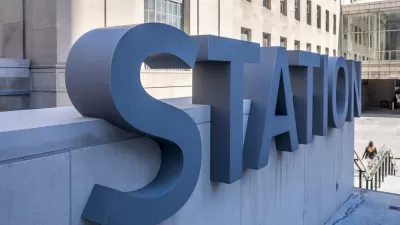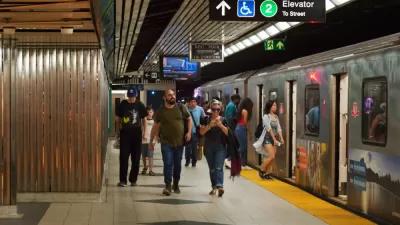Age-old transit planning questions will be raised over the next year in Toronto.
Oliver Moore writes a response to the news out of Toronto about an audacious transit plan put forward by the city's planning department in February. According to Moore, "residents could be forgiven if they tempered their optimism at the latest offering…with a dash of weariness," given the city's propensity for planning, but not delivering on big transit plans.
Moore intends to discover, an answer to the question of how likely the proposal is to be delivered. "The short answer is," explains Moore, "depends on which line. The next year will be crucial, as staff go through the messy and politically fraught business of figuring out and prioritizing the projects. City politicians have to decide how to pay for them."
Then Moore gets at the heart of an infinite amount of frustration and disappointment with transit planning the world over:
Handing decisions to unelected officials robs the process of democratic legitimacy. But leaving it in the hands of politicians, who may care more about the next vote than the next generation, carries the risk of constant detours, U-turns and cynical decisions.
This isn't the first time in recent weeks this question has come up. Taken together with an editorial by Ethan Elkind about the political process that created the new Gold Line extension in Los Angeles, we might say we have a trend in media commentary on transit planning.
Moore's article includes more detail about the political and bureaucratic process necessary to see the project's many components through. Also included is a list of all the projects included in the new plan, with descriptions of each proposed line.
FULL STORY: Toronto’s grand transit plan (maybe, hopefully)

Maui's Vacation Rental Debate Turns Ugly
Verbal attacks, misinformation campaigns and fistfights plague a high-stakes debate to convert thousands of vacation rentals into long-term housing.

Planetizen Federal Action Tracker
A weekly monitor of how Trump’s orders and actions are impacting planners and planning in America.

In Urban Planning, AI Prompting Could be the New Design Thinking
Creativity has long been key to great urban design. What if we see AI as our new creative partner?

How Trump's HUD Budget Proposal Would Harm Homelessness Response
Experts say the change to the HUD budget would make it more difficult to identify people who are homeless and connect them with services, and to prevent homelessness.

The Vast Potential of the Right-of-Way
One writer argues that the space between two building faces is the most important element of the built environment.

Florida Seniors Face Rising Homelessness Risk
High housing costs are pushing more seniors, many of them on a fixed income, into homelessness.
Urban Design for Planners 1: Software Tools
This six-course series explores essential urban design concepts using open source software and equips planners with the tools they need to participate fully in the urban design process.
Planning for Universal Design
Learn the tools for implementing Universal Design in planning regulations.
Gallatin County Department of Planning & Community Development
Heyer Gruel & Associates PA
JM Goldson LLC
Mpact (founded as Rail~Volution)
City of Camden Redevelopment Agency
City of Astoria
Jefferson Parish Government
Camden Redevelopment Agency
City of Claremont




























